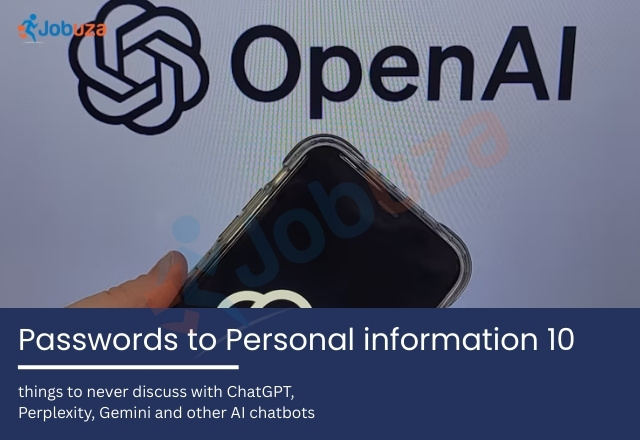10 Things You Should Never Share with AI Chatbots Like ChatGPT, Perplexity, and Gemini
Artificial Intelligence (AI) and AI chatbots are transforming the way we interact with technology. Platforms like ChatGPT-5, Perplexity AI, and Grok have made life easier by assisting with everything from writing emails and summarizing reports to giving relationship tips and even medical insights. For many users, having an AI assistant feels like living in a sci-fi movie.
However, as much as AI brings convenience, it also comes with serious privacy and security risks. What feels like a private conversation with an AI chatbot may not be as private as you think. Most AI platforms collect and store user data to train their models, which means anything you share might be stored, analyzed, or even exposed.
To protect your privacy, here are 10 types of information you should never share with AI chatbots.
1. Personal Information
Never share personal details like your full name, home address, phone number, or email with AI chatbots. While it may seem harmless, exposing such information can lead to identity theft, phishing attacks, or online scams.
AI systems are not built to provide complete anonymity. Hackers and malicious actors can piece together small details to track your identity, so it’s best to keep personal information private.
2. Financial Details
Your bank account numbers, credit card information, UPI IDs, or social security numbers should never be shared with chatbots.
Once entered, this data can be stored or intercepted, putting you at risk of fraud and identity theft. Even if an AI platform claims to be secure, it’s better to share financial information only on trusted and encrypted channels like official bank portals, never on AI chats.
3. Passwords and Login Credentials
One of the most common mistakes users make is sharing their passwords with AI chatbots or even asking them to generate one.
Cybersecurity experts strongly advise against this practice because your login details could be misused or compromised. Instead, always store your passwords in secure password managers like Google Password Manager or 1Password, never in AI chats.
4. Secrets and Personal Confessions
Many people use AI chatbots for late-night “therapy sessions” to share secrets or vent about personal issues. While AI might seem like a safe listener, these conversations are not truly private.
AI platforms often log chat data for training and monitoring purposes. Sharing deeply personal secrets or confessions could lead to unexpected privacy risks. If you need to talk, it’s better to confide in a trusted person or a licensed therapist.
5. Health and Medical Information
AI chatbots can simplify medical jargon, but they are not certified doctors. Sharing medical records, prescriptions, test reports, or insurance details with AI platforms can compromise your privacy.
Additionally, AI-generated medical advice might be inaccurate or misleading, which can negatively affect your health. For any medical concerns, always consult a qualified healthcare professional instead of relying on chatbots.
6. Explicit or Inappropriate Content
AI chatbots are programmed to flag explicit material, but that doesn’t mean your data isn’t stored. Sharing sexual content, offensive remarks, or illegal information could not only get your account flagged or suspended but may also leave behind permanent digital traces.
To protect your privacy and online reputation, it’s safer to avoid sharing explicit or inappropriate content with AI altogether.
7. Work-Related Confidential Data
Many employees unknowingly upload confidential company documents into AI chatbots for summarization, report generation, or spreadsheet formatting.
This is risky because AI models may store and use this data for training, which could lead to data leaks or corporate espionage. Always confirm your organization’s AI policies and avoid sharing internal reports, business strategies, or trade secrets with AI platforms.
8. Legal Matters and Disputes
AI chatbots can provide basic legal definitions but should never replace a qualified lawyer. Avoid discussing details of lawsuits, contracts, disputes, or agreements with chatbots.
Leaking sensitive legal information could affect your legal standing if it becomes exposed or misused. For anything beyond general knowledge, consult a licensed legal professional.
9. Sensitive Documents and Private Images
Uploading passports, Aadhaar cards, driver’s licenses, ID proofs, or private photographs to AI platforms is a major security risk.
Even if a chatbot claims to delete your files, digital traces may remain on their servers. These documents can be exploited for identity theft or fraud, so it’s best to store sensitive files in encrypted storage solutions rather than AI platforms.
10. Anything You Don’t Want Made Public
The golden rule of digital safety: if you wouldn’t post it on social media, don’t share it with AI chatbots.
While AI may seem private, your conversations could be stored, analyzed, and even reviewed by human moderators in some cases. Always assume that anything you type could be made public and think twice before sharing sensitive details.
Final Thoughts
AI chatbots like ChatGPT, Perplexity, Gemini, and Grok are becoming an integral part of daily life, but your privacy and security should always come first.
To stay safe:
-
Avoid sharing personal, financial, or sensitive data.
-
Regularly review the privacy policies of the AI platforms you use.
-
Use AI only for general queries, not for private or confidential discussions.
In an era where AI is evolving rapidly, your best defense is staying informed and vigilant. The less personal information you share with AI, the safer you’ll be.


